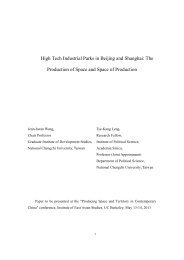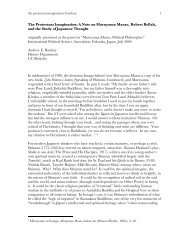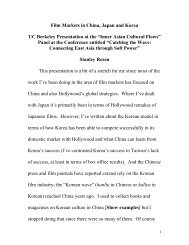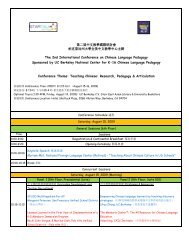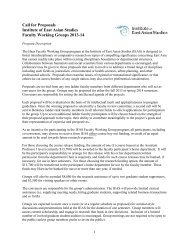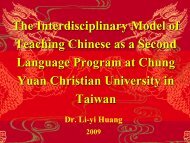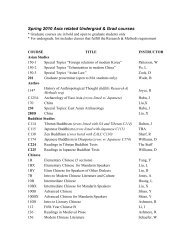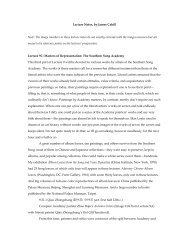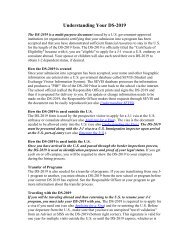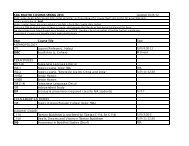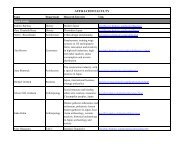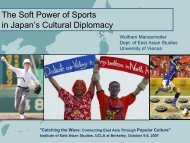Third Edition Spring 2013 - Institute of East Asian Studies, UC ...
Third Edition Spring 2013 - Institute of East Asian Studies, UC ...
Third Edition Spring 2013 - Institute of East Asian Studies, UC ...
You also want an ePaper? Increase the reach of your titles
YUMPU automatically turns print PDFs into web optimized ePapers that Google loves.
ported the advocacy activities <strong>of</strong> Indonesian ENGOs, and were ableto exert pressure on Suharto in a way that domestic political actorscould not. Again, one important factor behind their position<strong>of</strong> power was a decrease in oil prices. As I noted earlier, the dropin oil prices resulted in a severe decline in government revenueand a rise in government debt. This not only had the effect <strong>of</strong> constrainingdomestic government expenditure, but also reduced Indonesia’sfinancial independence, leaving the government muchmore dependent on the good will <strong>of</strong> foreign donors. Indeed, at thetime, the Suharto government was receiving financial assistancefrom several foreign governments as well as international organizationslike the World Bank. 29 This left it susceptible to pressurefrom these governments and organizations, and enabled these actorsto significantly constrain the Suharto regime with regard tothe suppression <strong>of</strong> Indonesian ENGOs.A stark illustration <strong>of</strong> how international actors were able toconstrain the Suharto regime can be seen in the Suharto government’sreaction to the perennial Southeast <strong>Asian</strong> “haze” problemcaused mostly by forest fires in Indonesia. 30 In 1995, when Suharto’sown environment minister tried to take action against threeplantation companies that had set fires contributing to the haze,he was stopped by the agriculture ministry, which was backed bySuharto. 31 In contrast, during the especially severe 1997 haze, bothSingapore and Malaysia were upset enough to publicly expresstheir displeasure over the failure <strong>of</strong> Suharto’s regime to controlthe forest fires that had caused haze in their countries. Perhapsbecause <strong>of</strong> the aid these countries had provided to Indonesia tocombat the haze, among other problems, Suharto was concernedenough to apologize publicly twice, his first public apologies. 32 Inaddition, the environment minister was empowered to enforceregulations that prohibited the use <strong>of</strong> fire to clear land, while theforestry minister was even able to revoke the logging licenses <strong>of</strong>176 concessionaires. 33 Thus, we can see the significance <strong>of</strong> internationalactors in constraining the Suharto government.Powerful international actors also directly worked againstthe Suharto regime’s suppression <strong>of</strong> ENGOs by providing concreteassistance to these groups. One major way in which this happenedwas when foreign actors used their own leverage to provide fundsto Indonesian ENGOs, even in the face <strong>of</strong> government displeasure.Through the 1985 Law on Social Organizations, the Suharto governmenthad placed restrictions on the ability <strong>of</strong> NGOs to receivefunding from foreign sources. 34 The Suharto government was warythat foreign funding would increase the power <strong>of</strong> domestic NGOs.However, powerful foreign organizations were still able to pressurethe Suharto government into allowing domestic ENGOs to receiveforeign funding. An example comes from the case <strong>of</strong> WALHI, whichvariously received funds from the US Agency for International Development(USAID), as well as the Canadian, Dutch, Swedish andJapanese Ministries <strong>of</strong> Foreign Affairs. 35 There is evidence that theU.S. government was pressuring Suharto by implying that it wouldonly continue supplying Indonesia with high-tech military equipment,such as F-15 aircraft, in return for the government’s acceptance<strong>of</strong> USAID funding for NGOs like WALHI. 36 This demonstratesone way in which support from powerful international actors wasimportant in helping Indonesian ENGOs survive despite the restrictivelaws placed on them.Other evidence for the importance <strong>of</strong> international leveragecomes from the decision <strong>of</strong> Indonesian ENGOs to consciouslyenlist the help <strong>of</strong> powerful international actors in their advocacyagainst the Suharto government. One example was when WAHLI29 Eldridge, Non-Government Organizations and Democratic Participation inIndonesia, 198.30 James Cotton, “The “Haze” over Southeast Asia: Challenging the ASEAN Mode<strong>of</strong> Regional Engagement,” Pacific Affairs 72 (1999): 331-332.31 Benedict Anderson, “Elections and Democratisation in Southeast Asia:Thailand, the Philipines and Indonesia,” Australian Broadcasting Corporation Radio 24Hours, radio program, 1992, quoted in Gordon, “NGOs, the Environment and PoliticalPluralism,” 17.32 Cribb, “More Smoke than Fire,” 6.33 Cotton, “The “Haze” over Southeast Asia,” 336.34 Robert Cribb, “The Politics <strong>of</strong> Pollution Control in Indonesia,” <strong>Asian</strong> Survey 30(1990): 1132.35 Joseph Molyneux, “Years <strong>of</strong> Living Dangerously: NGOs and the Development <strong>of</strong>Democracy in Indonesia” (paper presented at the 41 st annual convention <strong>of</strong> the International<strong>Studies</strong> Association, Los Angeles, CA, March 14-18, 2000.)36 Millidge Walker, “NGO Participation in a Corporatist State: The Example <strong>of</strong> Indonesia,”<strong>Institute</strong> <strong>of</strong> Urban & Regional Development Working Paper No. 678 (Berkeley:University <strong>of</strong> California at Berkeley, 1996), 18.49 Rachel Phoa Environmental NGOs in Indonesia 50



